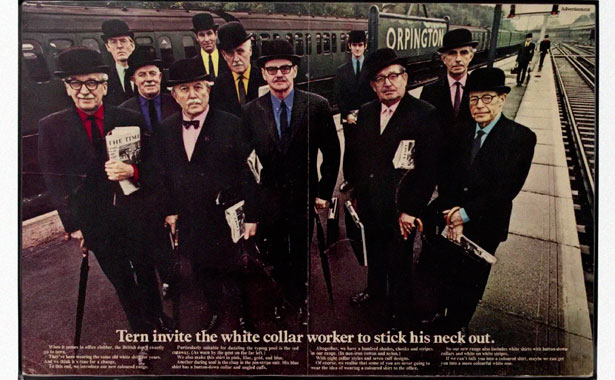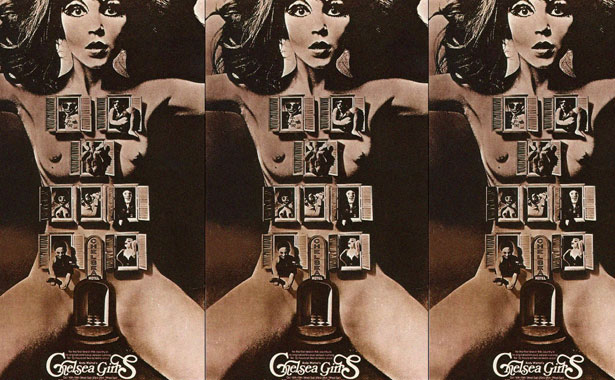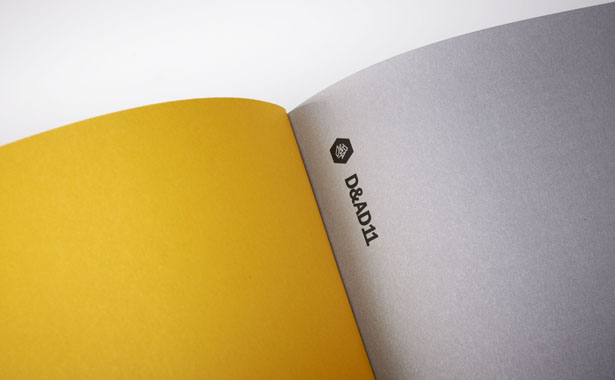The past, present and future of the D&AD Awards
D&AD is celebrating its 50th Anniversary this year, but it's not resting on its laurels. The 2012 Awards will be better than ever -- and there's plenty to look forward to too, as D&AD president Rosie Arnold explained in conversation with Computer Arts
Daily design news, reviews, how-tos and more, as picked by the editors.
You are now subscribed
Your newsletter sign-up was successful
Want to add more newsletters?

Five times a week
CreativeBloq
Your daily dose of creative inspiration: unmissable art, design and tech news, reviews, expert commentary and buying advice.

Once a week
By Design
The design newsletter from Creative Bloq, bringing you the latest news and inspiration from the worlds of graphic design, branding, typography and more.

Once a week
State of the Art
Our digital art newsletter is your go-to source for the latest news, trends, and inspiration from the worlds of art, illustration, 3D modelling, game design, animation, and beyond.

Seasonal (around events)
Brand Impact Awards
Make an impression. Sign up to learn more about this prestigious award scheme, which celebrates the best of branding.
Computer Arts: Tell me about this year's D&AD Awards. What’s so special about the 50th Anniversary do you think?
Rosie Arnold: "50 years of any awards is pretty special. When I started D&AD was the ultimate award to win and I believe it still is. What we’re trying to do with the 50th is to remind people of its relevance and put it back where it was. There have been so many new awards schemes popping up all over the place, but D&AD is still the awards that everyone wants to win, above and beyond anything else."
CA: Are awards still relevant? What message do you think they send out to creatives, to the industry, to the wider world?
RA: "There are a lot of things I’m wanting to do, whether or not I manage to achieve them… [laughs]. To me, design has never been more relevant. If you think of the event that Apple has had on people’s lives and the awareness now about the effect of design -- not just about the role of technology, but the way you interface with it -- is incredibly important. The design of the iPhone or the design of the Mac has been fundamental in forcing people to reappraise the role of design in their every day lives.
"Even if it comes down to [James] Dyson and what he’s done in terms of industrial design. So I think there is a greater awareness of the importance of design at large, beyond the design and advertising communities.
"I want to make D&AD more relevant to the communities outside that. We’ve also got to the stage where the government are cutting funding to education in the arts, dropping it. Industrial design has been completely cut from the curriculum. So we’ve introduced the White Pencil, which is the first new Pencil [Award] for 50 years. It’s going to be awarded to pieces of creative thinking, so it doesn’t matter what discipline it comes from, and it doesn’t matter what age you are. It’s a piece of creative thinking that changes the world for the better, because we believe that a creative solution can help solve business problems and make the world a better place.
"There are lot of examples in the past -- Live Strong, the Yellow Wristband, the TAK Project… You could argue that The Great Schlep with Sarah Silverman changed the outcome of the election process in America and got Obama in: a piece of creative thinking can change the world."
CA: You’re backing Peace One Day, is that right?
RA: "What we felt was it was too broad a criteria to just make the world a better place and it would be really good to harness the creative power around the world, to get behind a project that was global, that actually affected everybody’s life and had a bit of creative thinking about it, to have a really opportunity to make it work. We chose Peace One Day, because the founder, Jeremy Gilley, had already had a UN resolution in 2001, so the UN had already signed up to making the 21st September a global day of peace.
"In 2007 Jeremy went into Afghanistan and persuaded the Taliban to lay down their arms for that day and nearly two million children were inoculated against polio. So, not only was he saying that this is a day for peace that we need to recognise the same way that you do Valentine’s Day or Christmas Day or whatever, but that real good can actually be achieved just by people laying down their arms.
Daily design news, reviews, how-tos and more, as picked by the editors.
"We felt that there was a real opportunity to institutionalise it. The problem at the moment is that every year, Jeremy has to run around the world, telling people what it’s about and trying to get them to buy in. So we thought what we needed to do was push that relevance, the knowledge of it, to a tipping point., That’s what we’re going to try to do."

CA: You talked about raising awareness of the D&AD Awards. When most people think of awards they think of things like the Oscars, don’t they? Is that what you’re trying to do with the D&AD ones, to almost turn them into a household name?
RA: "I would love to do that. There are all sorts of schemes that we’ve had that, goodness knows, whether we’re going to get chance to do. I would love it if this award meant something to my mum... That would be brilliant. There are a number of thoughts we’ve got about how we can do that. I think it’s harder now than ever because of the financial situation in the world.
"But we’re trying to introduce a kite mark, so that when I go into John Lewis and buy an iron there might be a little swing tag with a D&AD logo on it that that tells me that it has won an award for design. There are other thoughts that I don’t want to tell you about yet because, and then they don’t happen, I’ll look like an idiot. I’ll call you up when I know something’s happening and tell you 'Look, I’ve managed to do this.'”
CA: How do you think people perceive the distinction between Yellow Pencils and Black Pencils? How does the ordinary man in the street know what they are?
RA: "I don’t the ordinary man in the street knows what it is. If you talk to anyone in the creative or design industries they know what it is. That’s why we need to make it relevant to people walking around the street. But I’m not going to kid myself.
"I think it’s a little bit like the RIBA Stirling Prize for architecture until that was televised, or the Man Booker Prize, because that then became incredibly relevant to people buying books. People started to understand what it was and why it was a good thing. That’s why talking about whether we can get a kite mark introduced or what we can do about publicising it, that’s the sort of thing we’re looking at to bring it to the broader population.
"When I’m talking about relevance I’m talking about to the creative community first and foremost. I think the thing that’s happened in the last 50 years is that we [D&AD] has gone global, before it was just the UK. If you look at the explosion in different media, just in the advertising world, let alone on the design world, it’s a massive beast now."
CA: Do you think charging 'from £85' to be entered for an award is the right way to go? Especially in these cash-strapped times?
RA: "The truth is it still represents good value. If you do get an award or you do get in the D&AD Annual that an enormous value-added option. With all the stuff we’re trying to introduce, you can now put 'accredited by D&AD', and the publicity you get around it is you know…"
CA: Why do you charge at all?
RA: "We have to charge. There’s an organisation of people running it, you have to get judges from all around the world, you have to hire a hall so you can look at all the work, there’s the administration costs.. If you didn’t charge you just couldn’t run the Awards. You’ll find that every other awards scheme charges as well. It’s not just D&AD."
CA: Do you think charging for the Awards creates the impression that people ‘buy’ the awards they receive?
RA: "Oh God no! [laughs]. Look at the amount of awards we could give out, then look at the amount of awards that we do give out. I think if you’re in the community that knows D&AD you would know that the opposite is actually the case. If anything we’re criticised for being overly harsh. People do say that just to get in the D&AD Annual is like winning an award in other schemes. I think if you spoke to people they’d say we don’t hand them out like any old thing. Black Pencils are like hen’s teeth."

CA: What have been your favourite ads / designs from the last 50 years?
RA: "I think Apple have made the most massive contribution. I loved the Million Project by David Droga. The year before last there was the Zimbabwean newspaper, which printed posters on money -- I thought that was stunning. Sometime ago BBH (Bartle Bogle Hegarty) won it for the twisted Levi’s idea. I can think of other things that should have won a Black Pencil that didn’t; John Hegarty did the original laundrette ad by Levi’s and that didn’t get a Pencil."
CA: Shocking.
RA: "[laughs] I know. If you think about what a seminal ad that was. That’s the one that got away, I think.
"The other thing that stuck out that I thought was really shocking that I really wanted to put back was the British Airways ad -- the face coming together -- remember that? That didn’t even appear in the D&AD Annual. I think that was a travesty. I know it wasn’t a completely perfect ad, but I think it was a seminal moment in advertising. I think it shifted a lot of the way ads then went on.
"What we need to do is remind ourselves is that D&AD is a record of what went on that year, that advertising is transitory, as is a lot of design, and that things disappear. I think Lewis Moberly did the most beautiful, groundbreaking wine labels for Asda many years ago and they changed the way supermarkets looked at designing their labels. Now if that hadn’t been awarded, not been in the D&AD Annual, there would have been no record of the shift that that piece of design had on the market. I think we are there as a record of groundbreaking, original work."
CA: You’re creating a legacy?
RA: "Exactly. I think what we need to be it not just about the past year, but about the future. In the next 50 years of D&AD, people are going to be looking at this Annual and they’re going to be drawing inspiration from it and seeing it as a record of note. I think we have to be long-sighted, not just short-sighted."
CA: D&AD's new identity for this year is Forward 50. How do you think media will change in the next 50 years?
RA: "I think media’s constantly evolving. I think the thing that’s most extraordinary, the most seismic change for me, has just been what you can do these days: In the past if I’d said I wanted a duck to talk to me while flying upside-down and turning its feathers from green to bright yellow and then into metal, there was absolutely no way I could have done that. I can do that now. So, what you can do is extraordinary. Where you can do it and how you can communicate with people is extraordinary. If I put it on YouTube, I can instantly see how people are responding to it.
"I think design is similar. If you have a new product and it’s out there people will talk about it. If it’s no good, it’s not going to get bought because there are all these star ratings on Amazon, etc. People will now tell you ‘this is no good, it looks nice but it doesn’t work’. I think there’s a sense throughout the design / advertising community that there’s nowhere to hide anymore. I think that’s going to be quite a shift going forward. That will be fairly self-selecting I suppose.
"There’s a lot of debate about whether we should continue having a D&AD Annual, about whether books are outdated."

CA: Nat Hunter was talking about that at the D&AD Annual launch...
RA: "I’m totally in the book camp. Because when you look at memory sticks, CDs, floppy disks, cassette tapes, technology changes continuously and you have no guarantee that today’s technology which we can all look at isn’t going to be yesterday’s technology that nobody has the facilities to look at anymore.
"A book is there, it’s permanent, you can look at it and you can refer back to it. It might get burnt, it might get water damage, but I know one thing for sure, I’m always going to be able to look at my book. I just worry that we grab technology with both hands and it’s gone."
"What I’m hoping -- being the eternal optimist -- is that in the next 50 years governments will understand the importance of design and communication; how it can change the world and make it a better place. I think this head-in-the-sand, invest-in-accountancy-and-money business is insane, because everything I look at has been designed and has a direct influence on my life.
"I hope there’s a harkening back to craft skills. I think all of this is being sidelined in the relentless pursuit of money. I hope there’s a re-evaluation of how good design can make the world. I don’t just mean altruistic stuff like Peace One Day you know, a hairbrush with a good handle [laughs] can make my life a better place."
Entry for the D&AD Awards 2012 is now open. The closing date for nominations is Wednesday 1 February 2012.

The Creative Bloq team is made up of a group of art and design enthusiasts, and has changed and evolved since Creative Bloq began back in 2012. The current website team consists of eight full-time members of staff: Editor Georgia Coggan, Deputy Editor Rosie Hilder, Ecommerce Editor Beren Neale, Senior News Editor Daniel Piper, Editor, Digital Art and 3D Ian Dean, Tech Reviews Editor Erlingur Einarsson, Ecommerce Writer Beth Nicholls and Staff Writer Natalie Fear, as well as a roster of freelancers from around the world. The ImagineFX magazine team also pitch in, ensuring that content from leading digital art publication ImagineFX is represented on Creative Bloq.
